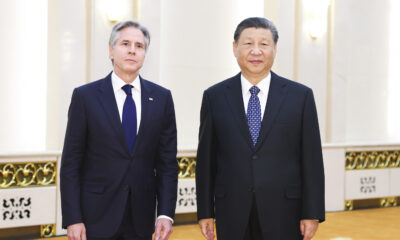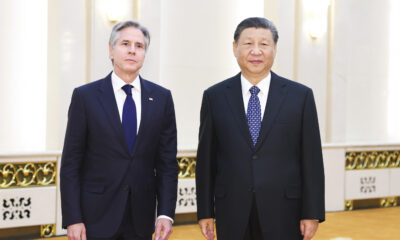Media
တရုတ်နိုင်ငံက ရေရှည်တည်တံ့သော လေယာဉ်လောင်စာဆီ အမြောက်အမြား အောင်မြင်စွာထုတ်လုပ်နိုင်
ပေကျင်း၊ ဇန်နဝါရီ ၂၅ရက် (ဆင်ဟွာ)
တရုတ်စီးပွားရေးလုပ်ငန်းတစ်ခုက ရေရှည်တည်တံ့သော လေယာဉ်လောင်စာဆီ (SAF) ကို တီထွင်ခဲ့ပြီး ၎င်းလောင်စာဆီကို မကြာမီတွင် စီးပွားဖြစ်ရောင်းချနိုင်မည်ဖြစ်ကြောင်း သိရသည်။ အဆိုပါ ရေရှည်တည်တံ့သောထုတ်ကုန်သည် တရုတ်နိုင်ငံ ၏ SAF အများအပြား ထုတ်လုပ်မှုအတွက် ရှေဆောင်ခြေလှမ်းတစ်ခုဖြစ်ကြောင်း Science and Technology Daily မှ သိရသည်။
Junheng Biology သည် တရုတ်နိုင်ငံ အလယ်ပိုင်း ဟဲနန် ပြည်နယ်၌ရှိသည့် ပုဂ္ဂလိက ရေနံဓာတု လုပ်ငန်းတစ်ခု ဖြစ်သည်။ ငါးနှစ်ကြာ သုတေသနနှင့် တိုးတက်မှုအဆင့် ဆောင်ရွက်ပြီးနောက် Junheng Biology မှ ကိုယ်ပိုင်တီထွင်ထားသော အစိမ်းရောင်နှင့် ကာဗွန်နည်းသော ဇီဝလောင်စာနည်းပညာကို အသုံးပြု၍ မီးဖိုဆောင်သုံးစွန့်ပစ်ဆီများကို ဇီဝဒီဇယ်နှင့် SAF အဖြစ်သို့ အောင်မြင်စွာ ပြောင်းလဲနိုင်ခဲ့ကြောင်း ယင်းလုပ်ငန်း၏အမှုဆောင်ဒါရိုက်တာ Zhang Zhenhui က ပြောကြားခဲ့သည်။
SAF သည် ဇီဝနည်းဖြင့်-ထုတ်လုပ်ထားသော အစိမ်းရောင် ဂျက်လေယာဉ် လောင်စာဆီများကို ပုံမှန်လောင်စာနှင့် အချိုးအစားအလိုက် ရောစပ်ထားသည့် လေကြောင်းလောင်စာအမျိုးအစားသစ်ဖြစ်သည်။ ယင်းမှာ လောင်စာ သံသရာလည်မှုအတွင်း ကာဗွန်ထုတ်လွှတ်မှုကို ၈၀ ရာခိုင်နှုန်းအထိ လျှော့ချနိုင်ခြေရှိကာ ယင်းမှာအစိမ်းရောင်လေကြောင်းစွမ်းအင်အတွက် အလားအလာရှိသော ရွေးချယ်မှု တစ်ခုဖြစ်စေကြောင်း သိရသည်။
“Junheng Biology က တရုတ်နိုင်ငံ မြို့ပြလေကြောင်းဦးစီးဌာန (CAAC) ကနေ ထုတ်ပေးတဲ့ SAF လေကြောင်း ပျံသန်းမှုဆိုင်ရာ ခွင့်ပြုချက် ပထမဆုံးရရှိခဲ့တဲ့ တရုတ်နိုင်ငံရဲ့ ပုဂ္ဂလိက လုပ်ငန်းဖြစ်ပါတယ်” ဟု CAAC က တာဝန်ရှိသူတစ်ဦးကပြောသည်။
ထို့ကြောင့် CAAC သည် အလောတော်နှင့် ရေရှည်စွမ်းအင်ချွေတာရေး၊ ဓာတ်ငွေ့ထုတ်လွှတ်မှုလျှော့ချရေးနှင့် အစိမ်းရောင်ဖွံ့ဖြိုးတိုးတက်ရေးတို့အတွက် အဓိက အာရုံစိုက်သည့်အနေဖြင့် SAF ကို ထုတ်လုပ်ခြင်းဖြစ်ကြောင်း သိရသည်။
၂၀၅၀ ပြည့်နှစ်မတိုင်မီ SAF ကို အသုံးပြုခြင်းဖြင့် လေကြောင်းကဏ္ဍတွင် ကာဗွန်ထုတ်လွှတ်မှု ၆၅ ရာခိုင်နှုန်းအထိ လျှော့ချပေးနိုင်မည်ဟု နိုင်ငံတကာလေကြောင်းပို့ဆောင်ရေးအသင်းမှ ခန့်မှန်းထားသည်။ SAF နည်းပညာဆိုင်ရာ အမျိုးမျိုးသော အောင်မြင်မှုများက ကမ္ဘာလုံးဆိုင်ရာ လေကြောင်းကဏ္ဍ၏ ကာဗွန်လျှော့ချသော အသွင်ကူးပြောင်းမှုအတွက် အရေးပါသော လမ်းကြောင်းတစ်ခု ဖြစ်လာနိုင်ကြောင်း သိရသည်။
ကမ္ဘာတစ်ဝန်းလုံးရှိ ရေနံလုပ်ငန်းအများအပြားသည် လက်ရှိရေပန်းစားနေသော SAF စီးပွားရေးလုပ်ငန်းကို ဝင်ရောက်လုပ်ကိုင်လျက်ရှိကြသည်။ ၎င်းတို့အနေဖြင့် ကမ္ဘာ့ ဒေသအနှံ့အပြားတွင် SAF စီမံကိန်းများ တည်ဆောက်ခြင်းနှင့် လည်ပတ်ခြင်းများကို လုပ်ဆောင်လျက်ရှိပြီး SAF သည် နိုင်ငံတကာ ရေနံလုပ်ငန်းစုများ၏ စွမ်းအင်ထောက်ပံ့မှုလုပ်ငန်းတွင် မရှိမဖြစ် အခန်းကဏ္ဍတစ်ခု ဖြစ်လာမည်ဖြစ်ကြောင်း ညွှန်ပြလျက်ရှိသည်။
၂၀၂၃ ခုနှစ် ဧပြီလတွင် တရုတ်နိုင်ငံ မြောက်ပိုင်းတွင် အထင်ကရ SAF ထုတ်လုပ်မှု အခြေစိုက်စခန်း တည်ထောင်ရန် အမေရိကန်စက်မှုလုပ်ငန်းစု Honeywell နှင့် တရုတ်နိုင်ငံ ထျန်းကျင်း လွတ်လပ်သောကုန်သွယ်မှုဇုန် တို့အကြား ပူးပေါင်းဆောင်ရွက်ရေး နားလည်မှုစာချွန်လွှာကို လက်မှတ်ရေးထိုးခဲ့သည်။ ယင်းဆောင်ရွက်မှုမှာ SAF အတွက် ကြီးထွားလာသော စျေးကွက်ဝယ်လိုအားကို ဖြည့်ဆည်းရန် ရည်ရွယ်ထားကြောင်း ကုမ္ပဏီဘက်မှ ပြောကြားခဲ့သည်။ (Xinhua)
…………………………..
(English Version)
China achieves mass production of sustainable aviation fuel
BEIJING, Jan. 24 (Xinhua) — A Chinese enterprise has developed a sustainable aviation fuel (SAF), it will be made commercially available soon. This sustainable product marks a pioneering step for the country’s SAF mass production, according to Science and Technology Daily.
Junheng Biology is a private petrochemical enterprise located in central China’s Henan Province. After a five-year research and development phase, it has successfully converted kitchen waste oils into biodiesel and SAF by using its self-developed green and low-carbon biofuel technology, said Zhang Zhenhui, executive director of the enterprise.
SAF is a new type of aviation fuel that blends bio-manufactured green jet fuel with traditional fuel in a certain proportion. It has the potential to reduce carbon emissions over the fuel’s life cycle by up to 80 percent, making it a viable alternative to green aviation energy.
“Junheng Biology is China’s first private enterprise to obtain SAF airworthiness approval issued by the Civil Aviation Administration of China (CAAC),” a CAAC official said.
Therefore, the CAAC has taken SAF as the key focus for the medium and long-term energy saving and emission reduction, and for the realization of green development.






